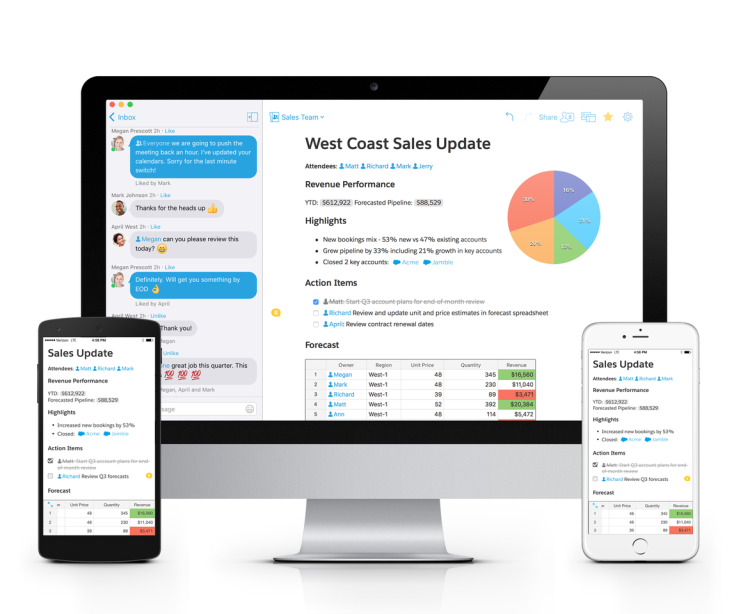In August, Salesforce purchased the word processing app Quip for $582 million, and today the first integrations between the two products are being revealed. Quip users will now be able to use their Salesforce credentials to access the app and will also be able to embed live CRM data into their documents and associate their work with a Salesforce record.
Quip’s support for Salesforce single sign-on is now available, while the data integrations will be made available in the first half of 2017.
“The core concept [of Quip] is reimagining productivity around communication — to be productive without email,” Quip chief executive Bret Taylor explained. “Most companies are drowning in emails. Very few people write memos in Word (versus email) because it’s important that people respond faster, without worrying about fonts, styles, etc.”
Just like with Slack, Quip’s single sign-on deal with Salesforce saves salespeople from having to remember another username and password. But this feature is the key to today’s announcement because authenticating with a Salesforce account means users are able to bring in their customer data to make their documents smarter and more efficient.
The pairing between Salesforce and Quip offers two features centered around sharing data. The first involves leveraging Quip’s Lightning component, meaning that any linking, accessing, and editing of documents, spreadsheets, and task lists can be made directly within Salesforce records. This eliminates the need to jump between multiple apps, thereby streamlining efforts within a single platform. Meeting notes, data, and other content within Quip and shared among team members can also be stored in company records, providing a better picture of the customer relationship.
With the second feature, Quip now supports live data within documents and spreadsheets. Traditionally, users would have to copy and paste data, but now variables can be added to files that will dynamically pull in the corresponding data, so if anything changes within Salesforce, it’ll automatically be reflected within the document. As Salesforce described it: “A Quip living document that serves as the weekly meeting agenda for a regional sales team can include the latest Salesforce data on closed deals and open opportunities.”
For Salesforce, bringing Google Docs-like functionality into its enterprise CRM improves the likelihood of sales. No longer will teams have to search for info about the latest conversation with a customer or most recent meeting — it can all be captured in a Quip document that’s attached to the record. In addition, when preparing a sales document that’ll be shared with a customer or internal teammate, salespeople won’t have to worry about working off of outdated figures — the document will constantly be pulling in the latest data.
“The productivity tool is becoming more efficient with the source of truth,” Taylor said.
In order to leverage rich mentions and Quip’s Lightning component, users need to first log in using their Salesforce data. Otherwise, the normal app experience will be provided.



